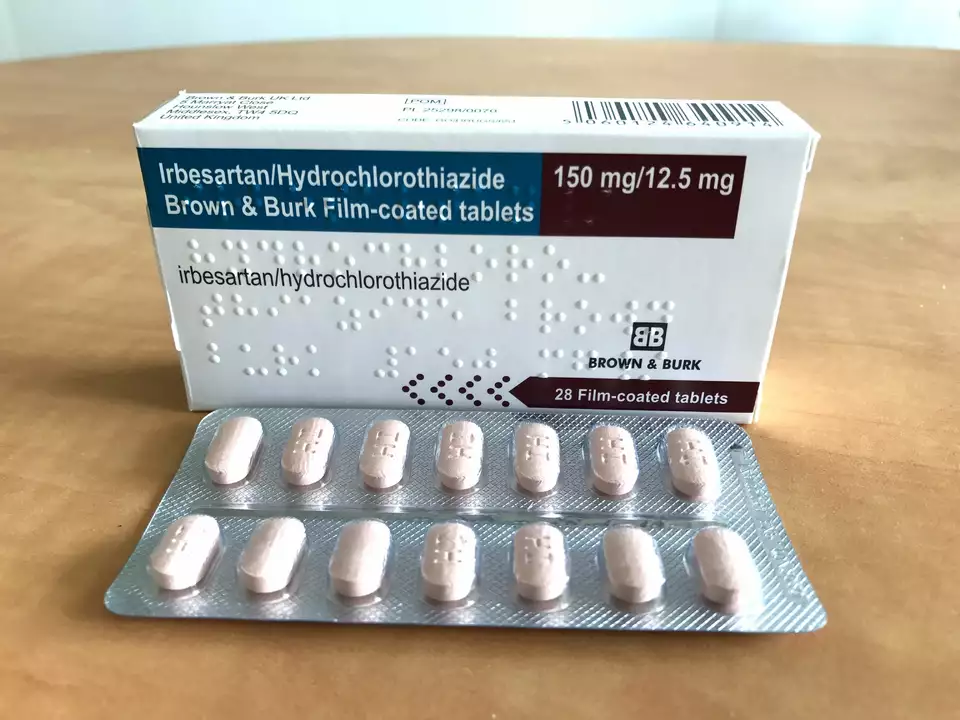Irbesartan Hydrochlorothiazide: What You Need to Know
If you or someone you care for has high blood pressure, you might see a pill labeled irbesartan hydrochlorothiazide. That’s a combo drug: irbesartan (an ARB) plus hydrochlorothiazide (a thiazide diuretic). Together they lower blood pressure by relaxing blood vessels and reducing fluid volume. This page gives clear, practical info about how it works, common doses, side effects to watch for, and simple safety tips.
How it works and common doses
Irbesartan blocks angiotensin II receptors so your blood vessels stay more relaxed. Hydrochlorothiazide makes you pee out salt and water, which brings down the amount of blood your heart has to pump. That combo often works better than either drug alone.
Typical fixed-dose pills you’ll see are 150/12.5 mg, 300/12.5 mg, and 300/25 mg (irbesartan/hydrochlorothiazide). Doctors usually start at a lower dose and adjust based on how your blood pressure responds. Never change dose without talking to your prescriber.
Side effects, interactions, and who should avoid it
Common side effects include dizziness (especially when standing), increased urination, headache, and tiredness. Hydrochlorothiazide can raise blood sugar and uric acid, which may worsen diabetes or gout. Irbesartan can affect potassium levels—sometimes higher—and both drugs can affect kidney function.
Serious signs to watch for: fainting, fast heartbeat, swelling of face or throat (angioedema), very low urine output, or sudden shortness of breath. If any of these happen, get medical help right away.
Drug interactions matter. NSAIDs (like ibuprofen) can blunt blood pressure effects and strain kidneys. Combining with potassium supplements or ACE inhibitors can raise potassium too much. Lithium levels may rise with this combo. Tell your doctor about all meds and supplements you take.
Do not use if you’re pregnant—ARBs can harm the fetus. If you’re breastfeeding, check with your provider. People with severe kidney disease or very low blood pressure often need different treatments.
For monitoring, expect blood pressure checks, blood tests for kidney function (creatinine) and electrolytes (potassium, sodium), and occasional glucose or uric acid checks. If you feel dizzy when standing, stand up slowly and report it.
Want to reduce blood pressure without higher doses? Small changes help: cut salt, move more, lose a few pounds if you can, and limit alcohol. Those steps often improve how well medication works.
Thinking of buying online? Use licensed pharmacies, require a prescription, read reviews, and avoid sites that promise no-prescription delivery. Cheap pills from unknown sellers can be fake or unsafe.
If you have questions about whether this medicine fits your situation, ask your doctor or pharmacist. They can tailor dose, check interactions, and set a monitoring plan so you stay safe while getting the benefit of lower blood pressure.

The Effects of Irbesartan Hydrochlorothiazide on Potassium Levels
I recently came across a study on the effects of Irbesartan Hydrochlorothiazide on potassium levels in the body. This medication is commonly used to treat high blood pressure and can significantly impact our potassium levels. The results showed that while some patients experienced a decrease in potassium, others maintained normal levels or even experienced an increase. It's important to monitor potassium levels when taking this medication, as imbalances can lead to health complications. Always consult your doctor for personalized advice and proper dosage adjustments.
Categories
- Medications (70)
- Health and Medicine (60)
- Health and Wellness (36)
- Online Pharmacy Guides (16)
- Nutrition and Supplements (9)
- Parenting and Family (3)
- Environment and Conservation (2)
- healthcare (2)
- prescription savings (1)



